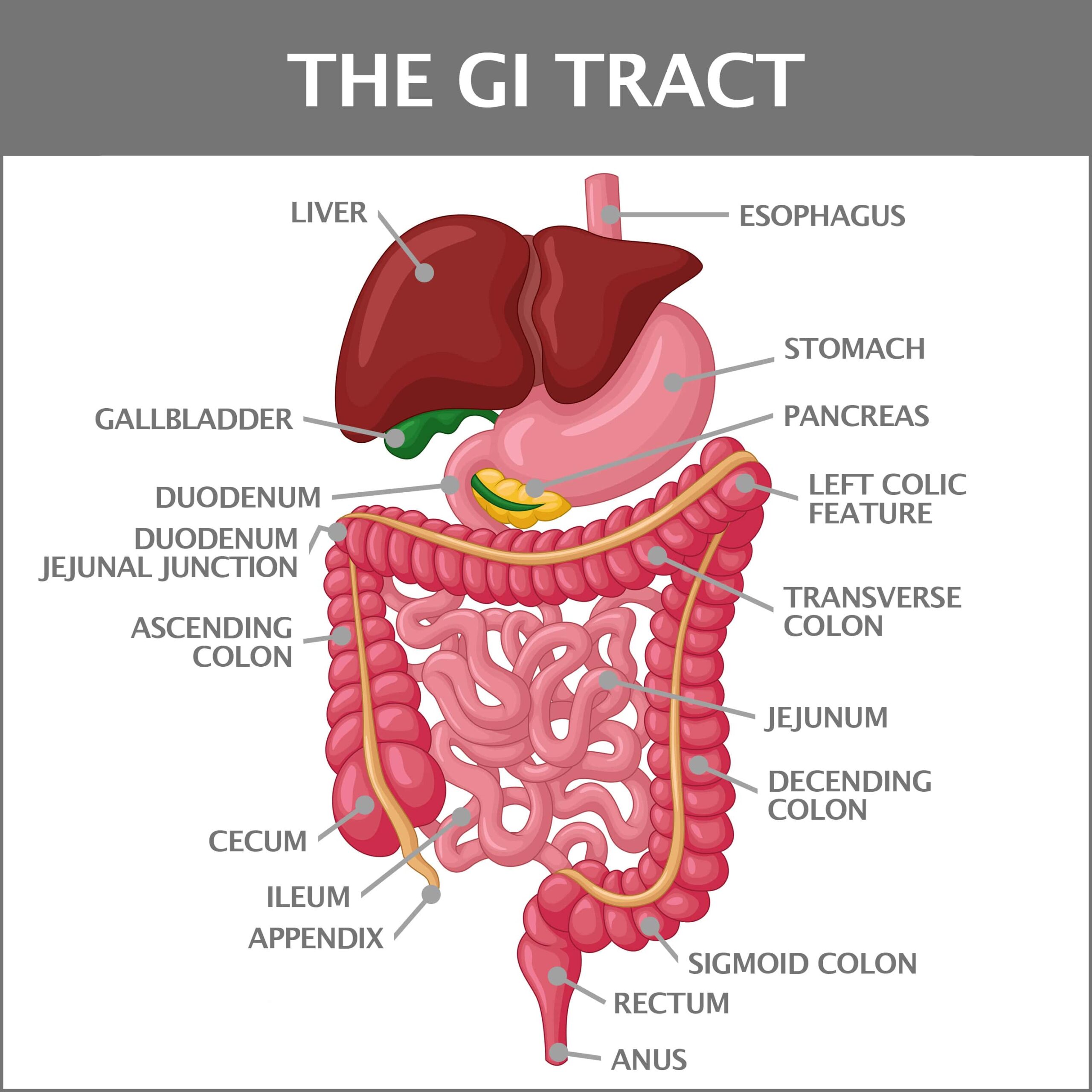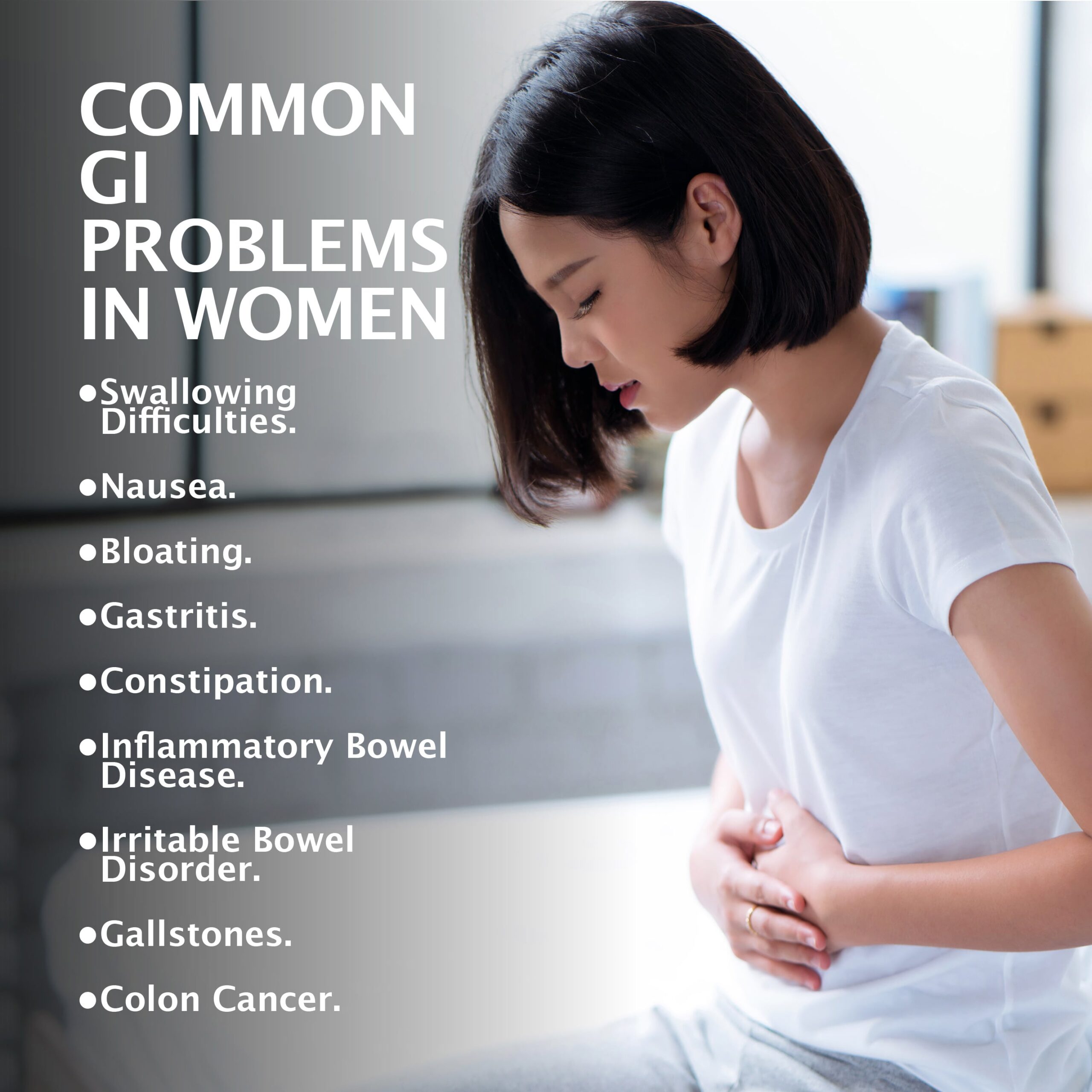
Common GI Problems In Women
The gastrointestinal system, often abbreviated simply as the GI, plays a crucial role inside your body. This network digests the foods you consume, absorbs the nutrients the body needs to carry out life-sustaining functions and eliminates waste products.
A woman’s GI tract is often influenced by different external sources than those impacting men. Occasionally, these issues cause any number of common GI disorders.
Brief Overview Of The GI Tract
The GI system is a network of organs so large that it is divided into two sections, labeled the upper and lower GI.
The upper region is made up of components such as the mouth, esophagus, stomach, and top portion of the small intestine. The lower GI is the lower small intestine, large intestine (colon), pancreas, gall bladder, and liver.
The upper GI breaks down foods and absorbs nutrients. The lower GI transports nutrients to the rest of the body, produces waste products, and helps the body rid itself of them.

Common GI Problems in Women
It is not surprising that the many heavy duties the GI tract is charged to perform places it at risk for various ailments. Some of these digestive issues are commonly seen in women, including:
Swallowing Difficulties: Research has found that women’s esophagus muscles function differently. The muscles contract and close with greater strength. This can be a sensation of having a lump form in the throat. It often occurs after one has consumed food or beverages. In scientific terms, this condition is referred to as globus.
Nausea And Bloating: Women digest food at a somewhat reduced rate compared to men. Slower digestion might bring forth more frequent bouts of symptoms like nausea and bloating.
Gastritis: Women stand at a greater risk of contracting a condition called gastritis. This condition is characterized by inflammation in the stomach lining and may lead to symptoms like abdominal pain, burping, and burning sensations in the abdomen. Advanced cases might cause bleeding and the development of gastric ulcers. Researchers think this is caused by the fact that many women regularly ingest stomach-irritating medications like over-the-counter pain-relieving and anti-inflammatory drugs.
Constipation: Women empty their colons less often than men. This may result from structural abnormalities in the rectum and anus.
Inflammatory Bowel Disease (IBD): This happens when there is inflammation of the colon and other parts of the digestive tract. Symptoms include abdominal discomfort, constipation, diarrhea, bloody stools, appetite loss, and weight loss. In severe cases, you might experience potentially serious problems like anemia and various nutritional deficiencies.
Irritable Bowel Disorder (IBS): This problem occurs when the nerves in your gastrointestinal network are uncharacteristically sensitive to certain stimuli. Researchers have found that the problem is seen in women twice to six times as often as it presents in men. Symptoms can be quite severe at times. This illness is classified as a functional disorder because it does not change the structural makeup of the colon or digestive tract the way certain inflammatory conditions can. The condition produces symptoms including:
- Diarrhea.
- Constipation.
- The alternating between diarrhea and constipation.
- Abdominal cramping.
- Bloating.
Gallstones: Gallstones are pieces of hardened cholesterol that form inside your gallbladder. If they grow to a significant size, they can cause abdominal pain, fever, nausea, vomiting, and possibly serious concerns like bowel obstruction. The problem happens more frequently in women because their bodies contain large amounts of the hormone estrogen. This chemical has been shown to slow gallbladder function and raise cholesterol levels in a key digestive substance called bile.
Colon Cancer: Colon cancer is the third most common cancer among women in the United States. If not caught early, the disease can prove fatal.

Treatments
Treatments your doctor employs to treat a specific GI condition will depend on several factors such as:
- The specific underlying problem.
- Illness’s severity.
- Your age.
- Your current general health.
Minor or nagging digestive problems might be reduced through natural efforts, including:
Limiting Stress: You likely deal with many personal, professional, financial, and social stressors. Excessive tension places significant pressure on the digestive system, often precipitates symptoms, and can increase your chances of contracting more serious problems. Find productive stress-busting outlets such as favorite hobbies, relaxation techniques, or breathing exercises.
Making Dietary Changes: Sometimes altering your diet can ease minor symptoms and reduce your risk of developing potentially serious GI concerns. Doctors and nutritionists suggest making nutritional changes like eating products containing fiber, supplementing meals with probiotic substances, and lessening your intake of frozen, processed, and canned foods.
Limiting Or Quitting Potentially Detrimental Vices: You might enjoy a cigarette, several cups of coffee or cola, or alcoholic beverages on a routine basis. These vices contain digestive system-irritating chemicals capable of producing unpleasant symptoms and illnesses. So you should use these vices in moderation or cut them out of your routine altogether.
Practicing More Optimal Lifestyle Habits: Engaging in efforts like eating smaller meals and not eating or drinking before bed can significantly improve digestion.
Keeping An Eye On Your Medications: Certain prescription and over-the-counter medications can irritate the digestive tract lining. Such events can produce unpleasant symptoms and heighten your risk for developing potentially dangerous illnesses such as gastritis, inflammatory bowel disease flare-ups, and stomach ulcers.
Exercising: Physical activity improves the digestive process, helps you maintain a healthy weight, and reduces stress.
Wearing Loose-Fitting Clothes: It may be hard to believe, but women might reduce certain incidents of GI problems by not putting on tight-fitting clothes. Overly tight pants and skirts can place extra pressure on digestive tract components. Such events could slow the digestive process or send corrosive substances like gastric acid back into your esophagus, causing heartburn.
Remaining Properly Hydrated: Water is crucial to proper GI system function. It plays a role in shepherding food through upper and lower GI. Inadequate water intake could result in slower digestion, resulting in symptoms like gas, bloating, and constipation.
When Should You Be Concerned About GI Problems?
Digestive issues are common and frequently occur in women. You should strongly consider consulting your gastroenterologist if you experience these red flag symptoms, including:
- Frequent bouts of diarrhea or constipation.
- Consistent or worsening abdominal discomfort.
- Lingering difficulty swallowing.
- The feeling that food sticks in your throat.
- A persistent sore throat or hoarseness.
- Unintentional weight loss of at least 10 pounds over a year or less.
- Repeated vomiting episodes
- Vomit containing blood or undigested food particles.
You are also urged to pay close attention to your stools. Fecal matter containing bright red streaks or that appear black and tarry can indicate the presence of bleeding somewhere along your gastrointestinal system.
Contacting Us
Digestive issues are common in women. They do not have to be prolonged, debilitating, or life-limiting when identified and treated at the earliest possible stage.
Our practice began more than 15 years ago and has emerged as one of the leading gastroenterology practices in central Florida. We perform various diagnostic procedures using state-of-the-art equipment in a friendly, comfortable, and inviting atmosphere where patient care is always a top priority. Contact us today!